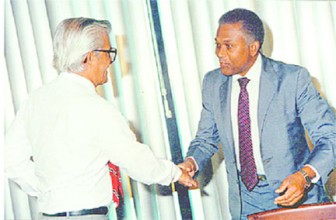(Trinidad Guardian) Former prime minister and president, Arthur NR Robinson, on Tuesday told the Commission of Enquiry into the July 1990 attempted coup that a Basdeo Panday-led faction sought to bring down the National Alliance for Reconstruction (NAR) Government. Panday, former prime minister and UNC opposition leader and a member of the NAR Government at the time (a few years before the coup d’etat) went about the country attacking him and his method of governance, Robinson said. He added: “I had information that even in my absence when I was abroad he would use the occasion to attack me in the country. “It appeared that the purpose was to bring down the Government.”
Shortly after the attempted coup, Panday and former prime minister Patrick Manning also mobilised all the support they could to frustrate the Government in all its activities, Robinson added. At the time the PNM was in Opposition having won only three seats to the NAR’s 33 in the 1986 general election. Robinson also recalled that the Government was debating the Anti-Corruption Bill at the time, part of an anti-corruption campaign to expose a train of corrupt activities of the previous PNM regime. He said the PNM had been in power a very long time and supporters had engaged continuously in corruption. He said then national security minister, Selwyn Richardson, was well known for his involvement in the campaign. He said when the Muslimeen members stormed the Red House they shouted aggressively: “Where Sello? Where Robbie?”

Robinson, who was shot by the insurrectionists, told the commission he knew Richardson would have been ill-treated, too, probably even more than he was because of his involvement in the anti-corruption campaign. Robinson, a witness in the inquiry, made the disclosures on the first day of his appearance at the Caribbean Court of Justice on Henry Street, Port-of-Spain. He was brought into the court in a wheelchair around 11 am and testified for nearly two hours. It was upon commission chairman David Simmons’ request for clarification on the political composition of the NAR that Robinson made the revelations about the Panday-led faction.
Asked by Sinanan if he had any disagreements with Panday, he replied yes. The first source of disagreement was the refusal of members of Panday’s party, the United Labour Front, a part of the coalition of parties that made up the NAR, to follow the Westminster system on which the T&T Constitution was formed, Robinson said. “Panday took the opinion that I was imposing rules,” he added. He said one aspect of the Westminster system was to have a body to review, allow or reject contracts in which the Government was to engage. Then works and transport minister John Humphrey said that was delaying his projects and proceeded to award contracts himself, Robinson said. Humphrey also wanted the Government to produce a new form of currency, the Trinity dollar, which they refused to do, Robinson said.
Humphrey went about putting the proposal to the country in speeches, he said. He added: “I had to expel him from the Cabinet. I didn’t know at the time that the Humphrey family and the Panday family were friends. “The Panday faction continued their course of disregard for Cabinet decisions. “They said they were in charge of their own ministries and no one, including the prime minister, should interfere. “They refused to accept the principles of Cabinet governance. I asked the entire Cabinet to resign.” Robinson said he offered them new appointments, thinking they would refuse, and giving them a non-controversial way of getting out. He said they accepted and continued their disruptive conduct and he had to have them expelled. He said they consulted in secret as Club 88 (formed in 1988). Asked by Sinanan if Government members had information about the 1990 insurrection, Robinson replied: “It was never brought to my notice that there was either knowledge or a fear that an insurrection would take place. Told by Sinanan that it was rumoured that members of the Government were aware of a pending insurrection, Robinson said it was not brought to his attention at the time.









